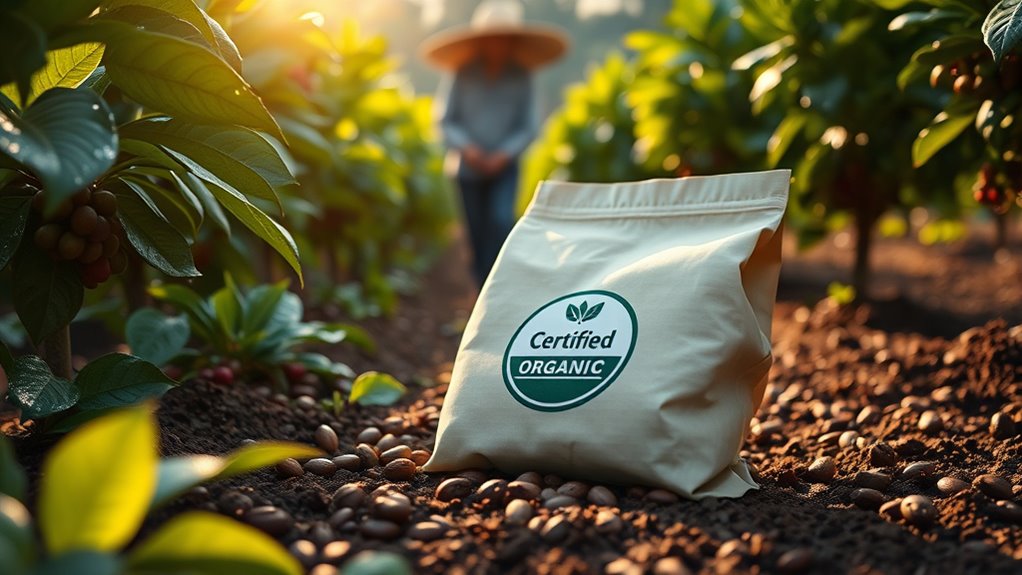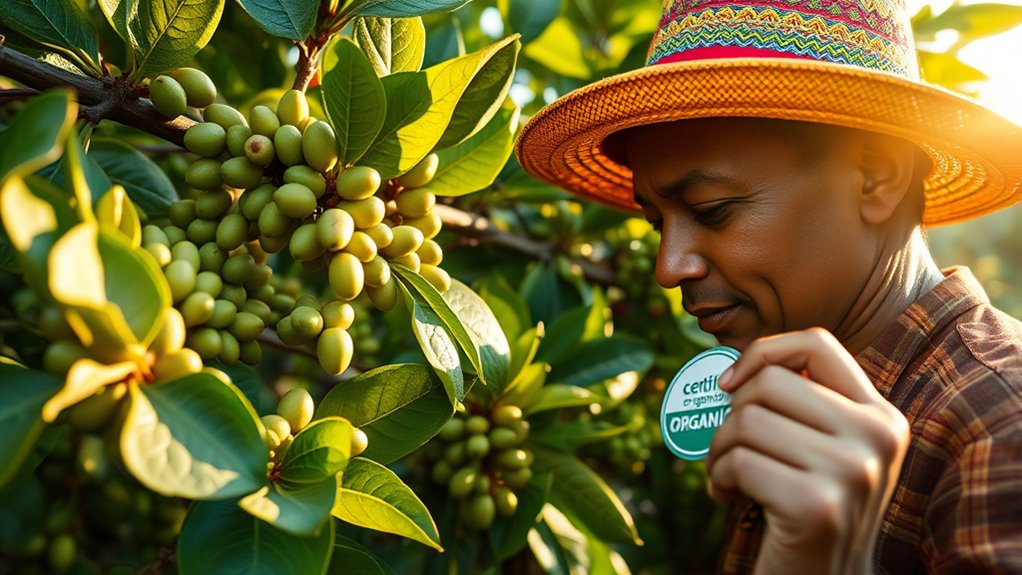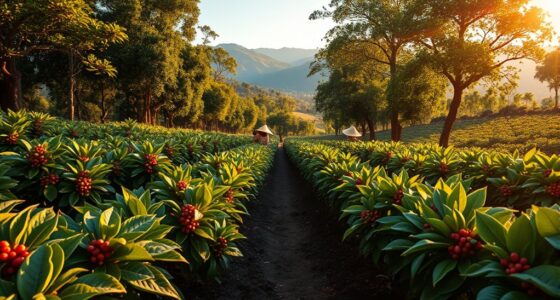Certification in sustainable coffee helps you identify products produced responsibly by verifying environmental, social, and economic standards through independent audits. These certifications, like Organic, Fairtrade, and Rainforest Alliance, ensure farms adopt eco-friendly practices, treat workers fairly, and support community well-being. They build trust and authenticity, showing a genuine commitment to sustainability. If you want to learn more about how certification impacts farmers, the environment, and your coffee choices, keep exploring this essential topic.
Key Takeaways
- Certification verifies compliance with environmental, social, and economic standards, ensuring responsible coffee production.
- It promotes biodiversity, ecosystem preservation, and climate resilience through sustainable farming practices.
- Certifications guarantee fair wages and improve community living conditions, supporting social justice.
- Certified coffee often commands higher prices, boosting farmers’ incomes and enabling sustainable investments.
- The certification process involves third-party audits, building consumer trust and demonstrating genuine commitment to sustainability.

Are you curious about how sustainable coffee earns its reputation? Certification plays a crucial role in establishing trust and ensuring that your favorite brew aligns with environmental, social, and economic standards. When you see labels like Organic, Fairtrade, Rainforest Alliance, Bird Friendly, UTZ, Starbucks C.A.F.E Practices, or 4C Certification on your coffee, you’re looking at a mark of commitment to responsible practices.
These certifications aren’t handed out lightly; they involve an independent verification process where third-party auditors inspect farms to ensure compliance with strict standards. This rigorous process guarantees that the certification isn’t just a marketing gimmick but a genuine commitment to sustainability.
By choosing certified coffee, you’re supporting programs that promote biodiversity. Certifications like Bird Friendly and Rainforest Alliance encourage shade-grown coffee, which preserves essential ecosystems and protects wildlife habitats. Organic certification ensures that synthetic pesticides and fertilizers are avoided, safeguarding water resources and reducing environmental pollution.
UTZ certification emphasizes sustainable farming practices, helping farmers minimize their ecological footprint. These eco-friendly methods also contribute to climate change mitigation by promoting resilient agricultural practices that can better withstand extreme weather conditions.
Certification isn’t just about environmental conservation; it also champions social fairness. When you buy certified coffee with Fairtrade or Rainforest Alliance labels, you’re helping ensure farmers receive fair prices for their work. These programs focus on fair labor rights and community development, improving living conditions for farm workers and their families.
Certifications often promote social inclusion and gender equality, empowering marginalized groups within farming communities. Organic and Fairtrade certifications also prioritize fair working conditions, ensuring that labor laws are followed and workers are treated with respect.
Economically, certification provides tangible benefits for farmers. Certified coffee generally commands higher prices, giving farmers increased income and financial stability. This premium helps them reinvest in sustainable farming practices and improve their communities.
Certification also opens doors to global markets, making it easier for farmers to sell their coffee internationally. Programs like Starbucks C.A.F.E Practices support economic stability for producers, encouraging long-term investment in sustainable cultivation.
These economic incentives motivate farmers to continue adopting environmentally friendly and socially responsible practices, creating a cycle of sustainability.
The certification process itself is voluntary yet rigorous. Farmers choose to participate, knowing that compliance with standards is required. Independent agencies inspect farms regularly to verify they meet the criteria, and farms must renew their certification annually to maintain their status.
Once certified, farmers gain the right to display the certification seal, demonstrating their commitment to sustainability and providing consumers like you confidence in your purchase. Overall, certification in sustainable coffee serves as a key link connecting consumers, producers, and the environment, fostering a more responsible coffee industry.
Frequently Asked Questions
How Do Certifications Impact Coffee Flavor Profiles?
You might notice that certifications influence coffee flavor profiles by encouraging sustainable practices like organic farming and shade-grown methods. These techniques promote healthier soil, richer ecosystems, and microclimate effects.
These environmental benefits enhance complex flavors such as fruit, chocolate, and floral notes. Certifications also motivate producers to focus on quality, ensuring you get a pure, distinctive cup that reflects regional characteristics and environmental harmony.
Are Certification Costs Passed to Consumers?
You might wonder if certification costs get passed to consumers. Usually, importers and roasters cover these expenses, but they often include the costs in the coffee’s price.
While some certification premiums can lead to higher prices, consumers who value sustainability are often willing to pay more. Market competition and awareness also influence whether these costs are fully or partially passed on, balancing affordability and ethical sourcing.
What Certifications Are Most Recognized Worldwide?
You’re wondering which certifications are most recognized worldwide. Rainforest Alliance and UTZ lead in environmental standards, with broad global recognition.
Fair Trade is highly trusted, especially in Western markets, for social and economic benefits.
USDA Organic appeals to health-conscious consumers, while SCA Certification stands out in the specialty coffee industry.
These certifications boost your reputation, ensuring your coffee meets high standards and gains trust across diverse international markets.
How Do Certifications Influence Farmers’ Income?
You might think certifications are just labels, but they’re like keys opening new doors for your income. They can secure better prices, especially with premiums for certified coffee, and provide stable income through guaranteed minimum prices.
While costs can rise, the potential for higher yields, improved quality, and access to niche markets often outweighs the expenses. Overall, certifications act as catalysts that can markedly boost your earnings and sustainability.
Can Certifications Guarantee Environmental Sustainability?
You might wonder if certifications can guarantee environmental sustainability. While they set standards and promote eco-friendly practices, they can’t assure full sustainability because implementation varies and some producers may not fully comply.
Certifications encourage better practices and conservation efforts, but their effectiveness depends on consistent enforcement and transparency. So, while helpful, certifications alone can’t fully guarantee environmental sustainability—you, as a consumer, should stay informed and look for genuine, verified certifications.
Conclusion
By choosing certified sustainable coffee, you become part of a vibrant tapestry where farmers’ hands nurture lush, thriving coffee plants, and the environment breathes a little easier. Your daily cup transforms into a symbol of hope, echoing the effort and care poured into every bean. With each sip, you help sustain these stories—rooted in respect, resilience, and a shared love for our planet’s future. Together, your choice fuels a greener, fairer coffee world.









